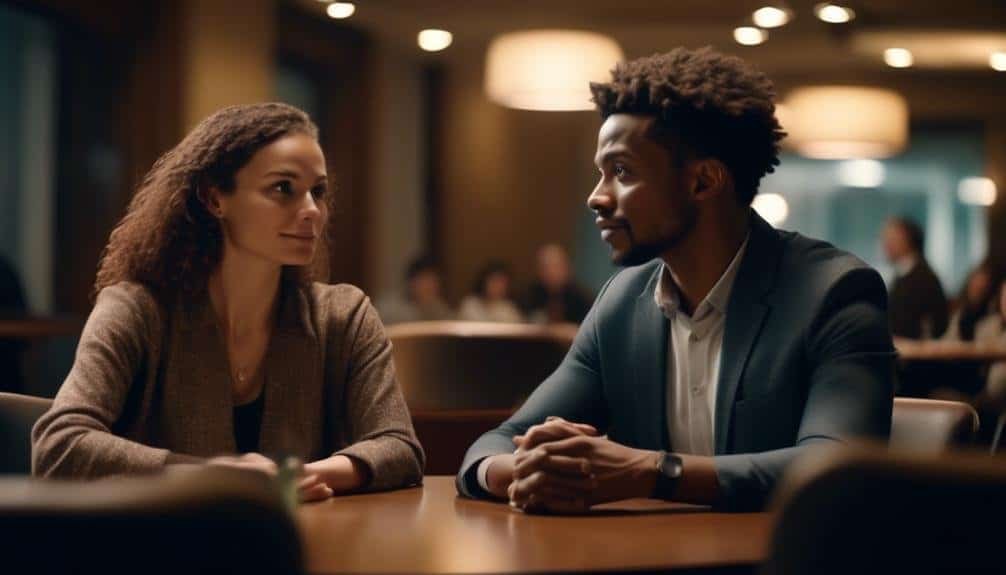What Is Conflict Resolution Coaching?
Have you ever found yourself caught in a never-ending cycle of arguments and disagreements with someone, unsure of how to find a resolution?
Conflict resolution coaching may be the answer you've been searching for. Imagine a scenario where two colleagues constantly clash, causing tension in the workplace.
Conflict resolution coaching provides a structured process and guidance to help individuals and teams navigate through conflicts, improve communication, and ultimately find a path towards resolution.
But what exactly is conflict resolution coaching, and how does it work?
Let's explore the definition, benefits, and key techniques used in this transformative coaching approach.
Key Takeaways
- Conflict resolution coaching is a practical and empathetic approach to resolving conflicts constructively.
- The purpose of conflict resolution coaching is to develop skills and strategies for effective conflict resolution.
- Conflict resolution coaching helps individuals explore different perspectives and understand underlying needs and interests.
- The role of a conflict resolution coach is to provide a safe and non-judgmental space, actively listen, empower individuals to find their own solutions, and provide practical strategies.
Definition and Purpose
Conflict resolution coaching is a practical and empathetic approach that aims to help individuals navigate and resolve conflicts in a constructive manner. The definition of conflict resolution coaching can be understood as a process where a trained coach supports individuals in developing skills and strategies to address conflicts effectively. The purpose of this coaching is to empower individuals to handle conflicts in a way that promotes understanding, collaboration, and sustainable solutions.
Conflict resolution coaching focuses on enhancing self-awareness and emotional intelligence, helping individuals identify their own triggers and reactions during conflicts. Through active listening and empathy, the coach assists individuals in exploring different perspectives and understanding the underlying needs and interests of all parties involved. This process enables individuals to develop effective communication and problem-solving skills, allowing them to engage in constructive dialogue and reach mutually beneficial resolutions.
The purpose of conflict resolution coaching goes beyond resolving immediate conflicts. It aims to equip individuals with the tools and mindset necessary to prevent future conflicts and build healthier relationships. By cultivating self-reflection and self-regulation, individuals can proactively manage conflicts, foster understanding, and create an environment conducive to open communication and collaboration.
Benefits of Conflict Resolution Coaching
As you explore the benefits of conflict resolution coaching, you'll discover how this practical and empathetic approach can empower individuals to navigate conflicts with understanding, collaboration, and sustainable solutions. Conflict resolution coaching offers numerous benefits that can positively impact your personal and professional life.
One of the key benefits of conflict resolution coaching is the development of effective communication skills. Through coaching, you'll learn how to express your thoughts and emotions clearly and assertively, while also being able to listen actively and empathetically to others. These skills enable you to engage in productive dialogue and find common ground, leading to more successful outcomes in resolving conflicts.
Another benefit is the ability to manage emotions during conflicts. Conflict resolution coaching helps you identify and regulate your emotions, allowing you to approach conflicts with a calm and composed mindset. By maintaining emotional balance, you can make rational decisions and avoid escalating conflicts unnecessarily.
Additionally, conflict resolution coaching helps you develop problem-solving and negotiation skills. You'll learn strategies for identifying the underlying issues and finding mutually beneficial solutions. This skill set allows you to resolve conflicts in a way that satisfies all parties involved, fostering stronger relationships and preventing future conflicts.
Success stories abound in conflict resolution coaching. Individuals have reported improved relationships, increased job satisfaction, and enhanced teamwork as a result of their coaching experience. They've found that conflict resolution coaching not only resolves current conflicts but also equips them with lifelong skills to navigate future conflicts more effectively.
The Role of a Conflict Resolution Coach
Conflict Resolution Coaches play a vital role in guiding individuals towards resolving conflicts and achieving positive outcomes through practical guidance and empathetic support.
As a conflict resolution coach, your role is to provide a safe and non-judgmental space for individuals to express their concerns and emotions. You help them explore different perspectives and understand the underlying causes of their conflicts. By actively listening and asking thought-provoking questions, you assist them in gaining clarity and developing effective communication skills.
Your objective as a conflict resolution coach is to empower individuals to find their own solutions and make informed decisions. You provide practical strategies and techniques to help them effectively manage their conflicts, whether it be in personal or professional relationships. Your empathetic support and encouragement create an environment where individuals feel understood and motivated to take action.
Finding a conflict resolution coach involves considering their qualifications, experience, and approach. Look for someone who's received proper training in conflict resolution and has a proven track record of helping individuals achieve positive outcomes. It's also important to find a coach who aligns with your values and understands your unique needs and circumstances.
Key Skills and Techniques Used in Conflict Resolution Coaching
As a conflict resolution coach, you'll need to possess a range of key skills and techniques to effectively guide individuals through the resolution process.
Active listening techniques will be crucial in understanding the perspectives and concerns of both parties involved.
Mediation strategies will help facilitate open and productive communication, while emotional intelligence skills will allow you to navigate and manage the emotions that arise during conflict.
These three elements are essential tools in conflict resolution coaching.
Active Listening Techniques
To effectively address conflicts, conflict resolution coaching utilizes key skills and techniques in active listening. Active listening is a crucial component of effective communication and involves fully engaging with the speaker and understanding their perspective.
As a conflict resolution coach, your role is to create a safe and supportive environment where both parties can express themselves freely. This requires focusing on the speaker's words, body language, and emotions, and providing non-verbal cues such as nodding and maintaining eye contact. It's important to avoid interrupting or judging the speaker, but instead, show empathy and understanding.
Reflecting back what the speaker has said and asking clarifying questions can help ensure accurate understanding and promote productive dialogue. By actively listening, you can build trust, encourage open communication, and guide the parties towards finding mutually acceptable resolutions.
Mediation Strategies
One effective mediation strategy used in conflict resolution coaching is to facilitate open and constructive dialogue between the parties involved. By creating a safe and neutral environment, the conflict resolution coach encourages the individuals to express their concerns and perspectives without fear of judgment or retaliation.
Through active listening and empathy, the coach helps the parties to understand each other's viewpoints and find common ground. Additionally, the coach employs various mediation techniques to guide the conversation towards a resolution. These techniques may include reframing the issues, brainstorming possible solutions, and encouraging compromise.
Conflict resolution skills such as effective communication, problem-solving, and negotiation are essential in mediating conflicts successfully. By employing these strategies, the conflict resolution coach can help the parties develop a deeper understanding of the conflict and work towards a mutually agreeable resolution.
Emotional Intelligence Skills
Emotional intelligence skills play a crucial role in conflict resolution coaching. These skills enable individuals to navigate and manage their emotions effectively, fostering understanding and resolution. Developing emotional intelligence is a key aspect of conflict resolution skills training. Increasing self-awareness is a focus, as individuals identify their emotions and understand how they impact their thoughts and actions during conflict. This allows for thoughtful and empathetic responses, rather than impulsive reactions. Conflict resolution coaching also aims to enhance empathy, helping individuals understand the emotions and perspectives of others involved in the conflict. Through emotional intelligence development, individuals can build stronger relationships, communicate more effectively, and find mutually beneficial solutions. Ultimately, by improving emotional intelligence, conflict resolution coaching empowers individuals to navigate conflicts with grace and compassion.
Conflict Resolution Coaching Process
Conflict Resolution Coaching involves guiding individuals through a structured process to help them effectively address and resolve conflicts in a practical and empathetic manner. Through this coaching process, you'll learn valuable conflict resolution techniques and strategies that can be applied in various personal and professional settings.
Here is a breakdown of the Conflict Resolution Coaching process:
- Assessment and Goal Setting
- The first step involves assessing the conflict situation and understanding your goals and desired outcomes.
- Together with your coach, you'll identify the specific areas that need improvement and set realistic goals for the coaching process.
- Skill Development
- In this phase, you'll learn conflict resolution techniques and strategies tailored to your specific situation.
- Your coach will provide you with practical tools and skills to enhance your communication, active listening, and problem-solving abilities.
- Practice and Feedback
- The next step involves practicing the newly acquired skills in simulated conflict scenarios.
- Your coach will provide feedback and guidance to help you refine your approach and overcome any challenges you may face.
- Implementation and Integration
- Finally, you'll apply the learned conflict resolution strategies in real-life situations.
- Your coach will support you as you navigate conflicts, providing guidance and helping you evaluate the effectiveness of your approach.
Different Types of Conflict Addressed in Coaching
When it comes to conflict resolution coaching, it's important to explore the different types of conflict that can be addressed.
Whether it's interpersonal conflicts within a team, conflicts between supervisors and employees, or even conflicts within oneself, coaching approaches can be tailored to suit each situation.
Conflict Types Explored
In conflict resolution coaching, a range of different conflict types are explored and addressed to help individuals navigate challenging situations. Understanding the specific type of conflict is crucial for implementing effective conflict resolution techniques and methods. Here are two sub-lists that delve into the various conflict types commonly addressed in coaching:
- Interpersonal Conflict:
- This type of conflict arises between two or more individuals and can be caused by differences in values, opinions, or personal preferences.
- Interpersonal conflict coaching focuses on improving communication skills, empathy, and finding common ground to enhance relationships and resolve disputes.
- Intrapersonal Conflict:
- Intrapersonal conflict occurs internally within an individual, often involving conflicting thoughts, emotions, or desires.
- Coaching for intrapersonal conflict aims to help individuals identify and manage their internal conflicts, develop self-awareness, and explore strategies to achieve inner harmony.
Coaching Approaches Used
Coaches employ a variety of approaches to address different types of conflict in conflict resolution coaching. These coaching strategies and conflict resolution techniques are tailored to the specific needs and circumstances of the individuals involved.
One common approach is the facilitative coaching style, where the coach helps clients explore their underlying interests and needs, encouraging them to find mutually beneficial solutions.
Another approach is the transformative coaching style, which focuses on personal growth and empowerment, helping clients shift their perspectives and develop new ways of thinking about conflict.
Additionally, coaches may use a directive coaching style, providing guidance and advice to clients on specific conflict management techniques.
The choice of coaching approach depends on the nature of the conflict and the goals of the coaching process, ensuring that clients receive the most effective support and guidance in resolving their conflicts.
Case Studies: Real-Life Examples of Conflict Resolution Coaching
Conflict resolution coaching provides real-life examples of how individuals can effectively address and resolve conflicts in their personal and professional lives. By examining conflict resolution case studies and real-life conflict resolution examples, you can gain insight into the practical application of conflict resolution coaching.
Here are two sub-lists that showcase the depth and complexity of conflict resolution coaching:
Conflict Resolution in the Workplace:
- In a case study involving a team of employees in a corporate setting, conflict resolution coaching was used to address communication breakdowns and power struggles. Through coaching sessions, the team members learned effective communication techniques, conflict resolution strategies, and how to collaborate and find common ground. As a result, the team was able to resolve conflicts more efficiently, improve productivity, and foster a positive work environment.
Conflict Resolution in Personal Relationships:
- In a real-life example, a couple sought conflict resolution coaching to address ongoing disagreements and improve their relationship. Through coaching, they learned active listening skills, effective communication techniques, and conflict resolution strategies. They were able to identify their underlying needs and concerns, express them in a constructive manner, and find mutually beneficial solutions. As a result, their relationship improved, and they reported feeling more connected, understood, and satisfied.
How to Find a Conflict Resolution Coach
When searching for a conflict resolution coach, it's important to consider their experience, qualifications, and approach in order to find the best fit for your specific needs. Finding a coach who specializes in conflict resolution training can greatly enhance your ability to navigate and resolve conflicts effectively.
Start by conducting thorough research to identify potential coaches in your area. Look for individuals who've extensive experience in conflict resolution and have received proper training in this field. It's also beneficial to consider their educational background and any relevant certifications they may hold.
Once you have compiled a list of potential coaches, take the time to schedule initial consultations with each of them. During these consultations, ask about their approach to conflict resolution and how they tailor their coaching to address specific needs. Discuss their previous experiences working with clients who've faced conflicts similar to yours.
Additionally, inquire about their success rate and how they measure the effectiveness of their coaching. It's crucial to find a coach who not only possesses the necessary knowledge and skills but also resonates with your values and communication style.
Success Stories and Testimonials From Conflict Resolution Coaching Clients
Are you curious about the real-life success stories and testimonials from clients who've benefited from conflict resolution coaching? Hearing about the experiences of others can give you a better understanding of how conflict resolution coaching can positively impact your own life.
Here are some success stories and testimonials from clients who've undergone conflict resolution coaching:
- Importance of follow up in conflict resolution coaching:
- One client shared that the follow-up sessions provided them with ongoing support and guidance, allowing them to reinforce the strategies they'd learned during the coaching process.
- Another client mentioned that the follow-up sessions helped them stay accountable and motivated to continue implementing the new communication techniques they'd acquired.
- Common challenges faced by conflict resolution coaching clients:
- Many clients expressed that one of their main challenges was learning to manage their emotions during conflict situations. Through coaching, they were able to develop techniques to control their emotions and respond more effectively.
- Another common challenge faced by clients was the fear of confrontation. Conflict resolution coaching provided them with the necessary tools to approach difficult conversations with confidence and assertiveness.
These success stories and testimonials highlight the importance of follow-up in conflict resolution coaching, as well as the common challenges faced by clients. By learning from the experiences of others, you can gain insight into how conflict resolution coaching can help you navigate conflicts in your own life.
Conclusion
Congratulations! You have discovered the power of conflict resolution coaching. By working with a skilled coach, you can unlock your potential to navigate conflicts with confidence and find peaceful resolutions.
Don't let conflicts hold you back any longer. Take the leap and find a conflict resolution coach who can guide you towards a happier, more harmonious life.
Start your journey today and experience the transformative impact of conflict resolution coaching for yourself.







